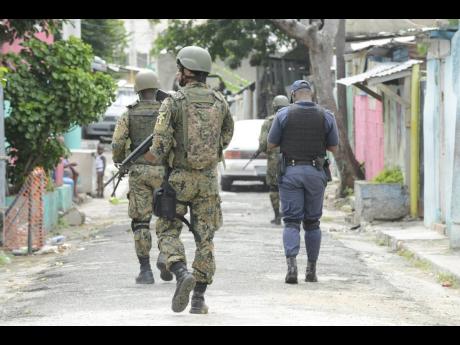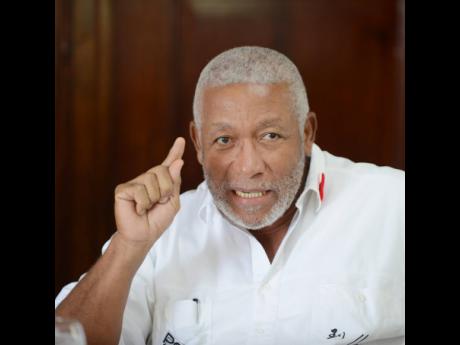Hardley Lewin | The soldier, the policeman, his duty and his dilemma
How often have you, as a law-abiding Jamaican, given even a fleeting thought to the ever-present dangers faced by members of our security forces on a daily basis, as they carry out their duties to keep us safe from harm. Consider this scenario; a joint police-military patrol responds to reports of heavy gunfire in an inner-city community. It is 2 a.m., and on arrival in the general area, they realise that they have to traverse on foot down a narrow dirt lane hemmed in on both sides by a line of zinc fences.
They hear intermittent bursts of automatic gunfire, followed by a series of three explosions. From down the lane, they see what appears to be dwelling structures going up in flames from what they surmise to be fire bombs. There are persons unknown screaming for help, murder, while emerging from dwelling shacks behind the fence.
The patrol calls for backup and advances cautiously. Who and where are the gunmen? Who are these persons running towards them? People are shouting above the loud barking of several dogs. There is confusion. There are no street lights, it is dark.
POLICING REALITY
Nerves are frayed, their palms are sweaty, their hearts are beating rapidly. They get the feeling that at any moment a gunman will emerge from the shadows and open fire at them. Criminal gunmen obey no laws; that is what makes them criminals. The members of the security forces, on the other hand, are bound by the rule of law and will be held accountable.
In this highly strung and confused situation, mistakes can be made. The soldier or the policeman can fire at what he deems to be a deadly threat, and get it wrong. What appears to be a handgun (may) turn out not to be so, and he finds himself in trouble and facing the courts.
Conversely, he could hold his fire with a view to be absolutely sure of the classification of the threat, and end up dead. If fired upon, and fire is returned, a clear case of self-defence applies, no problem. But, must a member of the security force wait to be fired upon before himself responding with deadly force?
No, a member of the security forces who does so would be foolishly courting injury or death. The imminent threat of the use of deadly force, or what is called ‘hostile intent’, is sufficient to trigger a deadly response. The circumstances that led to a determination of hostile intent have to be processed in seconds and acted upon. A judgement call has to be made, and this call could make the difference between the life or death of the soldier, the policeman, a criminal gunman or an innocent person. The key question that follows any incidence of fatal shooting by a member of the security force is: Based on all the circumstances, was the action of the military or police justified?
Was the shooting justified, not justified, or was it an accident? That soldier or policeman stands in judgement. Those who sit in judgement of the actions of the members of the security forces will do so from the sterile, calm interior of an air-conditioned space. The circumstances and the conditions prevailing at the time of the incident can never be properly recreated or imagined.
The police have a duty to serve and protect. In carrying out this duty he is assisted by the soldier. They are governed by the same rules of engagement and the rule of law. They operate in hostile situations and in dangerous neighbourhoods.
A former commissioner of police rationalises this scenario somewhat as follows: “It is better to be judged by a jury of your peers than to be carried from church by eight of your colleagues.”
THE SOLDIER’S DILEMMA
Or, consider an incident some 19 years ago when a 10 -year-old girl was brutally murdered when gunmen set fire to her family house and stood by, preventing neighbours from coming to her aid. Citizens sought assistance from a group of soldiers who were stationed nearby. The soldiers’ immediate response was to advise that they had no authority to move without the police, while at the same contacting Up Park Camp to get instructions. In the end, they responded on their own initiative after about some 10 minutes delay. The public was outraged that having called on the military for help, that help was not forthcoming in the manner that they expected, and that is, an immediate response.
So, what transpired during that period of delayed response? In addition to seeking specific authority to move, the corporal would be contemplating his options and a host of what-ifs.
The soldiers were under strict instructions that they must not deploy without the police. To do so would be in contravention of clear instructions and long-standing practice. The soldiers found themselves trapped between their clear instructions and legal constraints on one hand, and their conscience on the other, having received reports of citizens in grave danger and requiring a response. They found themselves on the horns of a dilemma. If they respond without the police, they would have no greater authority than that of any other citizen acting at common law.
Let us say the soldiers, on arrival at the scene, were fired upon and they returned the fire, acting in their inherent right of self-defence. If the gunmen were killed or apprehended and guns recovered, the soldiers would be celebrated as heroes and lauded for using their initiative.
On the other hand, and in the same circumstances,what if no gunmen were killed or captured, no gun(s) recovered, and a number of residents killed or injured in the crossfire?
The first question that people are going to be asking is; Why were the soldiers deployed without the police–what is the legal basis? I would not be at all surprised if there were a narrative from some quarters suggesting that no gunmen were actually present when the soldiers arrived, and...we know the rest. Policeman’s Prayer
In concluding, I share this poem titled Policeman’s Prayer, which I came across many years ago; the author is unknown:
“When I start my tour of duty God
Wherever crime may be,
As I walk the darkened streets alone
Let me be close to You
Please give me understanding with
Both the young and old
Let me listen with attention until
Their story’s told
Let me never make a judgement
In a rash or callous way
But let me hold my patience, let each
Man have his say
Lord, if some dark and dreary night
I must give my life
Lord, with your everlasting love,
Protect my children and my wife.”
Policing in Jamaica is a difficult and at times a thankless job. I do not believe that the members of our security forces are whinging and whining about the state of play, knowing fully well that they voluntarily signed up to serve. But the next time you come across a soldier or policeman, it would go a long way if you would say to him, “Hello, thank you for your service.”
Rear Admiral (Rtd) Hardley Lewin served for 36 years in the Jamaica Defence Force, the last five as its Chief of Staff. He went on to serve as Commissioner of Police of the Jamaica Constabulary Force for two years. Send feedback to columns@gleanerjm.com.


